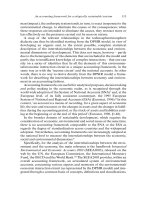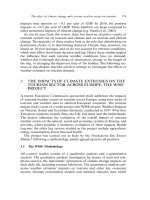THE ECONOMICS OF MONEY,BANKING, AND FINANCIAL MARKETS 363
Bạn đang xem bản rút gọn của tài liệu. Xem và tải ngay bản đầy đủ của tài liệu tại đây (31.28 KB, 1 trang )
CHAPTER 13
Banking and the Management of Financial Institutions
331
Adverse selection in loan markets requires that financial institutions
screen out the bad credit risks from the good ones so that loans will be profitable
to them. To accomplish effective screening, lenders must collect reliable information from prospective borrowers. Effective screening and information collection
together form an important principle of credit risk management.
When you apply for a consumer loan (such as a car loan or a mortgage to purchase a house), the first thing you are asked to do is fill out forms that elicit a great
deal of information about your personal finances. You are asked about your salary,
bank accounts, other assets (such as cars, insurance policies, and furnishings), and
your outstanding loans; your record of loan, credit card, and charge account
repayments; and the number of years you ve worked and who your employers
have been. You also are asked personal questions such as your age, marital status, and number of children. The lender uses this information to evaluate how
good a credit risk you are by calculating your credit score, a statistical measure
derived from your answers that predicts whether you are likely to have trouble
making your loan payments. Deciding on how good a risk you are cannot be
entirely scientific, so the lender must also use judgement. A loan officer, whose job
is to decide whether you should be given the loan, might call your employer or
talk to some of the personal references you supplied. The officer might even make
a judgement based on your demeanour or your appearance (this is why most people dress neatly and conservatively when they go to a bank to apply for a loan).
The process of screening and collecting information is similar when a financial
institution makes a business loan. It collects information about the company s
profits and losses (income) and about its assets and liabilities. The lender also has
to evaluate the likely future success of the business. So in addition to obtaining
information on such items as sales figures, a loan officer might ask questions about
the company s future plans, the purpose of the loan, and the competition in the
industry. The officer might even visit the company to obtain a firsthand look at its
operations. The bottom line is that, whether for personal or business loans,
bankers and other financial institutions need to be nosy.
SCREENING
One puzzling feature of bank lending is that a bank
often specializes in lending to local firms or to firms in particular industries, such
as energy. In one sense, this behaviour appears surprising because it means that
the bank is not diversifying its portfolio of loans and is therefore exposing itself to
more risk. But from another perspective, such specialization makes perfect sense.
The adverse selection problem requires that banks screen out bad credit risks. It
is easier for a bank to collect information about local firms and determine their
creditworthiness than to collect similar information on firms that are far away.
Similarly, by concentrating its lending on firms in specific industries, the bank
becomes more knowledgeable about these industries and is therefore better able
to predict which firms will be able to make timely payments on their debt.
SPECIALIZATION IN LENDING
Once a loan has
been made, the borrower may have an incentive to engage in risky activities that
make it less likely that the loan will be repaid. To reduce this moral hazard, financial institutions must adhere to the principle for managing credit risk that a lender
should write provisions (restrictive covenants) into loan contracts that prevent borrowers from engaging in overly risky activities. By monitoring borrowers activities
to see whether they are complying with the restrictive covenants and by enforcing
the covenants if they are not, lenders can make sure that borrowers are not taking
MONITORING AND ENFORCEMENT OF RESTRICTIVE COVENANTS









